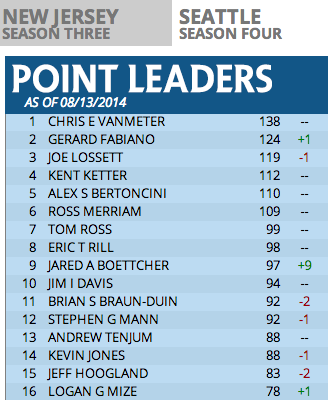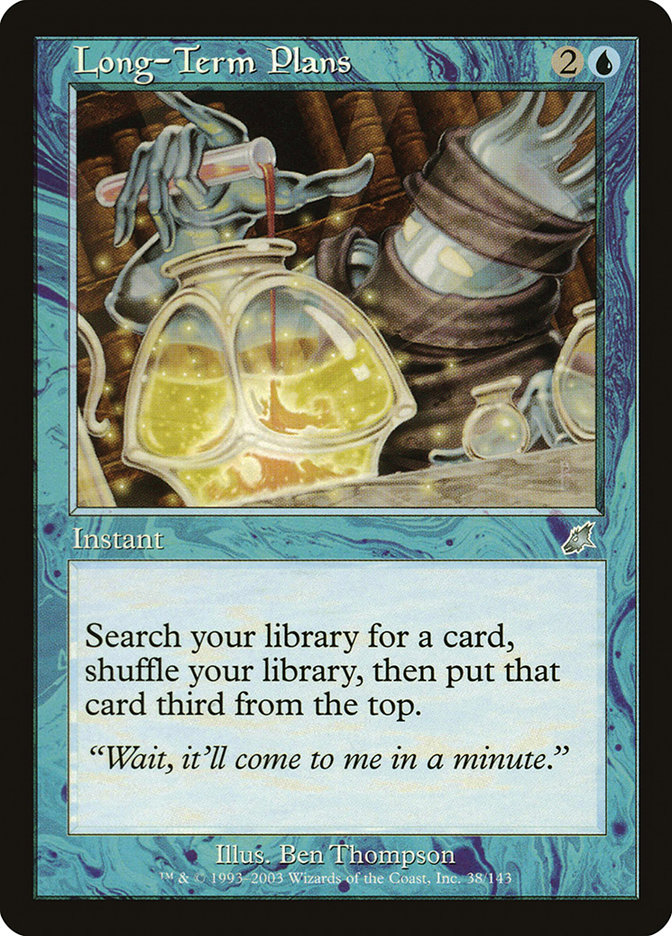I’ve been handling this very poorly.
I decided early on this year that I was going to make a run at the SCG Players’ Championship. The Open Series really is awesome, and the Players’
Championship seemed like a good goal that I could accomplish without being all-in on Magic. I’ve done pretty well over the last few years on the Open
Series circuit and at a few random PTs, but I have not played this much Magic, not since I was grinding to try and make the train for a few years from
2006-2009.
One of the things that has helped me in this quest is my fortunate location on the eastern seaboard. Not only do we get a pretty good amount of Opens, but
there are also numerous local stores in the area that hold IQs and Super IQs. While work, school, and other obligations might keep me from being able to
attend distant Opens, IQs have provided me with a great local way to scrounge up some points when I can’t make the trek to an Open.
Last Saturday I played in an IQ at Comic Book Depot in Wantagh, a smaller local game store that is just large enough to hold an IQ. I decided I wanted to
try something other than U/W Control for a change and picked up Owen Turtenwald’s B/W Midrange deck from the Pro Tour without playing a single game with
it.
I lost two frustrating matches and quickly dropped at 0-2.
As I dropped and left the store at 2:30 in the afternoon, I was mad. I knew Jared Boettcher had just had a torrid weekend and passed me on
the leaderboard, and that it was imperative that I get as many points as possible each weekend. IQs also have more in common with an FNM than an Open, and
in a 30-person, five round event that has a softer field than an Open I expect to make top 8; going 0-2 is almost inexcusable.
It’s strange to think after so many years of playing Magic and spending my time in competitive ventures, and after so many years of figuring out the right
way to do things that it’s possible to go about things so incorrectly.
With such a big, long-term goal in mind, I had forgotten basically every important tenant of how to conduct oneself in a competitive venture.
Entitlement
I don’t care how good you are, what you’ve done, or how inexperienced your opposition is – nobody is entitled to anything.
I went into this most recent IQ expecting to win. Now this sounds like it’s a good thing, as confidence is one of the most important things in both
competition and life; why show up if you don’t think you are going to win? But the problem is that I was expecting to win like it was a formality. I
thought to myself: “I’ve won a good amount of IQs this year, I’ve got a lot of points, and I’m just gonna show up this Saturday to get some more points
because that’s what I’ve been doing.” I picked up a deck I’ve never really played before, got zero games in with it before the event, didn’t discuss with
my friends how to sideboard or do any real planning, and lost. Do I think the matches were somewhat non-representative and that maybe I should have won
them? Perhaps. But I have a rule (one of many it seems I’ve forgotten):
“You can only complain about variance if you did everything absolutely perfectly.”
(Here’s a hint – you didn’t. Don’t waste time complaining; try to figure out what you could have done differently.)
One of the most important things you can do in any game with a random element like Magic or Poker is to do your best to put yourself in a good spot to win.
Control the things you can control, and give yourself the best chance to succeed. I did none of these things.
Yes, sometimes you can just pick up a deck and run with it all the way to first place. I know I’ve done it before and watched others do it. But if you are
intending to put your best foot forward and are serious about winning because it is important, you need to understand that there is no substitute for hard
work.
Expectations
Another rule from the Jim-Davis-book-of-life-rules-that-I-have-apparently-forgotten-all-about:
“Expectations are poison.”
Goals are great. As I said at the start, I’ve made it a goal this year to qualify for the Players’ Championship at the end of the year. I think I’ve got a
very good shot, and with some hard work and a little bit of luck, I hope to be competing alongside many of my friends and fellow writers at the end of the
year for quite a bit of money.
While expectations and goals sound similar, they are actually pretty different.
Goal – the object of a person’s ambition or effort; an aim or desired result.
Expectation – a belief that someone will or should achieve something.
The difference is the mentality behind both.
A goal creates an aura of hard work and achievement. You have a goal, you want to achieve it, so you figure out what you need to do and try as hard as you
can to accomplish it. If you fail, you can look back and see what you did wrong and then try again with a new goal. A goal is a positive thing even if you
fail; as long as you know you put in the effort, you know you’ve at least grown as a result of the journey.
An expectation has nothing to do with hard work or achievement. It is assumed, expected. Your parents feeding you as a child is an expectation; it is
something you take for granted, and you only notice if it doesn’t happen. You expect to get paid on payday, you expect to get presents for your birthday.
Expectations are a negative thing; you aren’t happy you have them, you are only unhappy when what is expected doesn’t happen. You feel cheated, slighted.
A goal is all about the journey; expectations are all about the destination.
It’s not only hard to learn anything when you are focused on only the destination, but you also end up putting a lot of unnecessary pressure on yourself
that really doesn’t need to be there.
When you have expectations, you inevitably create a ton of unwanted pressure. You are no longer thinking about your task at hand but rather a big picture
of potential failure if your expectations are not met. This pressure, of course, makes it much harder to meet your expectations, as your focus is not where
it should be, and thus, creates a negative feedback loop that creates an enormous distraction.
Scoreboard Watching
Speaking of distractions, over the last few months I’ve spent a lot of time looking at this:

Now I don’t think that I travel enough to have a shot at winning a season, but my avenue to the Players’ Championship is likely going to be the eight
“at-large” slots at the end of the year. The eight highest point leaders who are not already qualified will earn their invitations, and considering that a
few of the Invitational and Season winners are likely to be in that top eight, it is more likely it will be more like a top eleven or twelve.
So I have kept a weekly watch on this scoreboard, watching players rise and fall with little red and green numbers as I try to maintain my spot.
This is incredibly stupid.
“Scoreboard watching” is something you hear a lot about whenever a team in any sport is in the heat of a playoff race. Inevitably, some sports reporter is
going to ask the teams coach or star player if they’ve been watching their competition, if they know how many games they need to make up, or if their
competitor won or lost that night.
But what does it matter?
Right now the Yankees are seven and a half games back of Baltimore in the AL East. Does this mean they are going to play any differently than if they were
down by one game? Or up by six?
(Aside: Yes, from a managerial or front office standpoint perhaps these things matter a little; a team down by fifteen games might want to go into sell and
rebuild mode, or a team up by ten games might want to rest its aging star players, but right now, I’m talking about how the players play the game.)
While they are human and maybe they don’t play with as much pop down by twenty games because they feel demoralized and out of the race, philosophically
nothing should change.
Are they still going to try to get base hits? Score runs? Pitch well? Make solid plays in the field? Hit home runs and strike guys out? Play hard and win
every game they can?
This is something that is easy to lose sight of in such a long-term, year-long venture.
Whether I’m in third place or sixteenth place, as long as I am still alive, does anything change? Should I not be practicing before events? Picking out my
decks and working with them so I’m comfortable with all my matchups and sideboarding? Playing solidly and with conviction?
Looking at the leaderboard does nothing to change any of these factors.
One Game At A Time
It’s the same thing on a smaller scale when you are actually in a tournament. If you are 1-0 or 7-0, is anything different? How about 0-1 or 4-1-1?
Very often my friends will come up to me during a tournament and ask how I’m doing. Inevitably when I answer 8-1 or 3-1-1 or whatever I may be, they will
immediately start doing math about what I will need to do to top 8. In between them saying I need to win one more or that I’m still alive if I win out, I
often say something to the effect of this:
“Look, I’m just going to keep playing until they stop putting opponents in front of me.”
Whether I have to win nine in a row to make top 8, just have one win and in to go, or if winning a finals match will give me $10k, the fact remains that
I’m going to sit down and try as hard as I can to win a match. If there are more matches to be played, I can think about those later.
While “one game at a time” is one of the biggest cliches in sports, it really is the best approach. When you focus all of your mental energy on the moment,
you give yourself the best chance to win and the best chance to achieve all of your big picture goals as well.
Losing sight of all this in the face of a large, year-long goal is foolish, but I am very happy to have realized it. This weekend at the Open Series in DC
will not be about getting enough points to catch so and so or making sure I will have such and such of a buffer. It’s time to close the leaderboard and
just play my best, and let the chips fall where they may.


